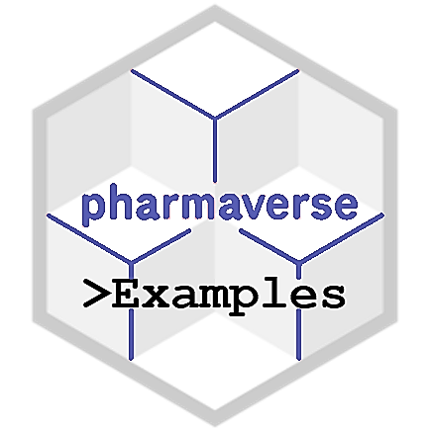ADRS
Introduction
The Response Analysis Dataset (ADRS) is an essential part of oncology clinical trials for monitoring disease response and progression. This article describes how to create an ADRS ADaM dataset, focusing on common oncology endpoint parameters based on RECIST v1.1 criteria. The primary response values include CR (Complete Response), PR (Partial Response), SD (Stable Disease), NON-CR/NON-PD (Non-CR/Non-PD), PD (Progressive Disease), and NE (Not Evaluable). See {admiral} and {admiralonco} for more information. Find other {admiral} functions and related variables by searching admiraldiscovery
This guide uses key pharmaverse packages along with tidyverse components to demonstrate the step-by-step process, ensuring the inclusion of metadata, validation, and exporting to a compliant SAS transport file (XPT).
Load Packages
First, we load the necessary packages required for creating the ADRS dataset.
Load Specifications for Metacore
Load the specifications stored in an Excel file into a {metacore} object.
Load Source Datasets
We load the required SDTM datasets (RS, TU) and ADaM dataset (ADSL) necessary for creating the ADRS dataset.
Sample of Data
Merging ADSL with RS
Merge ADSL to the RS domain by selecting only the necessary variables for derivations.
Pre-processing of Input Records
Select Overall Response Records and Set Parameter Details
Filter the RS domain to include only overall response records assessed by the investigator and set the parameter details accordingly.
Date Imputation and Deriving ADT, ADTF, AVISIT
Impute missing dates and derive analysis dates and visits.
Derive AVALC and AVAL
Populate AVALC with assessed values and create the numeric version AVAL.
Flag Worst Assessment at Each Date (ANL01FL)
Flag the worst assessment at each date, considering only valid assessments from the randomization date onward.
worst_resp <- function(arg) {
case_when(
arg == "NE" ~ 1,
arg == "CR" ~ 2,
arg == "PR" ~ 3,
arg == "SD" ~ 4,
arg == "NON-CR/NON-PD" ~ 5,
arg == "PD" ~ 6,
TRUE ~ 0
)
}
adrs_anl01fl <- adrs_aval %>%
restrict_derivation(
derivation = derive_var_extreme_flag,
args = params(
by_vars = exprs(STUDYID, USUBJID, ADT),
order = exprs(worst_resp(AVALC), RSSEQ),
new_var = ANL01FL,
mode = "last"
),
filter = !is.na(AVAL) & ADT >= RANDDT
)Sample of Data
Deriving Parameters
Derive Progressive Disease Parameter
Use the admiral::derive_extreme_records() function to find the date of first PD.
adrs_pd <- adrs_anl01fl %>%
derive_extreme_records(
dataset_ref = adsl,
dataset_add = adrs_anl01fl,
by_vars = exprs(STUDYID, USUBJID),
filter_add = PARAMCD == "OVR" & AVALC == "PD" & ANL01FL == "Y",
order = exprs(ADT, RSSEQ),
mode = "first",
exist_flag = AVALC,
false_value = "N",
set_values_to = exprs(
PARAMCD = "PD",
PARAM = "Disease Progression by Investigator",
PARCAT1 = "Tumor Response",
PARCAT2 = "Investigator",
PARCAT3 = "RECIST 1.1",
AVAL = yn_to_numeric(AVALC),
ANL01FL = "Y"
)
)Sample of Data
Derive Death Parameter
Create a new death parameter using the death date from ADSL.
adsldth <- adsl %>%
select(STUDYID, USUBJID, DTHDT, !!!adsl_vars)
adrs_death <- adrs_pd %>%
derive_extreme_records(
dataset_ref = adsldth,
dataset_add = adsldth,
by_vars = exprs(STUDYID, USUBJID),
filter_add = !is.na(DTHDT),
exist_flag = AVALC,
false_value = "N",
set_values_to = exprs(
PARAMCD = "DEATH",
PARAM = "Death",
PARCAT1 = "Reference Event",
AVAL = yn_to_numeric(AVALC),
ANL01FL = "Y",
ADT = DTHDT
)
) %>%
select(-DTHDT)Derive Last Disease Assessment Parameter
Create a parameter for the last disease assessment.
adrs_lsta <- adrs_death %>%
derive_extreme_records(
dataset_ref = adsl,
dataset_add = adrs_death,
by_vars = exprs(STUDYID, USUBJID),
filter_add = PARAMCD == "OVR" & ANL01FL == "Y",
order = exprs(ADT, RSSEQ),
mode = "last",
set_values_to = exprs(
PARAMCD = "LSTA",
PARAM = "Last Disease Assessment by Investigator",
PARCAT1 = "Tumor Response",
PARCAT2 = "Investigator",
PARCAT3 = "RECIST 1.1",
ANL01FL = "Y"
)
)Sample of Data
Apply Metadata and Perform Associated Checks
Apply metadata and conduct checks to ensure data quality and compliance.
adrs_checked <- adrs_lsta %>%
add_variables(metacore) %>% # Add variables specified in the metadata
drop_unspec_vars(metacore) %>% # Drop variables not specified in metadata
check_variables(metacore) %>% # Check all variables specified are present and no more
check_ct_data(metacore) %>% # Check controlled terminology
order_cols(metacore) %>% # Order columns according to metadata
sort_by_key(metacore) # Sort rows by sort keysApply Labels and Formats with xportr
Finally, apply labels, formats, and export the dataset to an XPT file.
dir <- tempdir() # Specify the directory for saving the XPT file
adrs_xpt <- adrs_checked %>%
xportr_type(metacore, domain = "ADRS") %>% # Coerce variable types to match metadata
xportr_length(metacore) %>% # Assign variable lengths from metadata
xportr_label(metacore) %>% # Assign variable labels from metadata
xportr_format(metacore) %>% # Assign variable formats from metadata
xportr_df_label(metacore) %>% # Assign dataset labels from metadata
xportr_write(file.path(dir, "adrs.xpt")) # Write the XPT file── Variable type mismatches found. ──✔ 1 variable coercedWarning: Column `STUDYID` contains string values longer than user width 8.
Width set to 12 to accommodate.